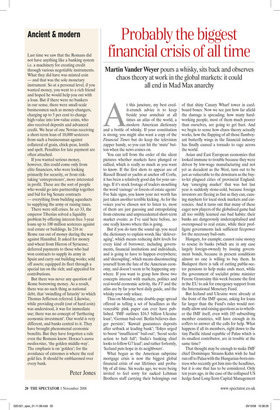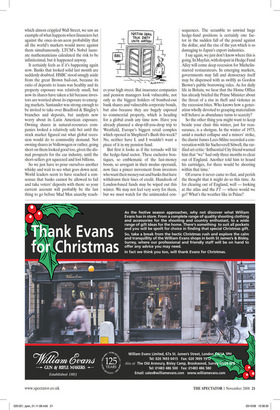Probably the biggest financial crisis of all time
Martin Vander Weyer pours a whisky, sits back and observes chaos theory at work in the global markets: it could all end in Mad Max anarchy At this juncture, my best credit-crunch advice is to keep beside your armchair at all times an atlas of the world, a modern American dictionary and a bottle of whisky. If your constitution is strong, you might also want a copy of the Financial Times but do keep the television zapper handy, so you can hit the ‘mute’ button when the news comes on.
You can tell from the order of the silent pictures whether markets have plunged or rallied, which is really as much as you want to know. If the first shots to appear are of Russell Brand or yachts at anchor off Corfu, it has been a relatively good day for your savings. If it’s stock footage of traders mouthing the word ‘carnage’ or forests of estate agents’ For Sale signs, you know your net worth has just taken another terrible kicking. As for the voices you’ve chosen not to listen to, most of them are just guessing and extrapolating from extreme and unprecedented short-term market events: as I’ve said here before, no one really knows where this is going.
But if you do turn the sound up, you need the dictionary to explain words like ‘deleveraging’, which means reducing debt levels for every kind of borrower, including governments, financial institutions and individuals, and is going to have to happen everywhere; and ‘decoupling’, which means disconnecting yourself from the fate of the American economy, and doesn’t seem to be happening anywhere. If you want to grasp how those two concepts interact with markets, politics and real-world economic activity, the FT and the atlas are by far your best daily guide, and the whisky your only solace.
Thus on Monday, one double-page spread offered as telling a set of headlines as the venerable pink paper can ever have published. ‘IMF outlines $16.5 billion Ukraine loan’; ‘German bail-out: Berlin believes danger persists’; ‘Kuwait guarantees deposits after setback at leading bank’; ‘Tokyo urged to boost “insufficient” bail-out’; ‘Seoul seeks action to halt fall’; ‘India’s banking chief looks to follow G7 lead’; and rather forlornly, ‘Iceland puts hope in its neighbours’.
What began as the American subprime mortgage crisis is now the biggest global financial crisis of our lifetimes and probably of all time. Six weeks ago, we were being invited to feel sorry for sacked Lehman Brothers staff carrying their belongings out of that shiny Canary Wharf tower in cardboard boxes. Now we see just how far afield the damage is spreading; how many hardworking people, most of them much poorer than ourselves, are going to get hurt. And we begin to sense how chaos theory actually works, how the flapping of all those flamboyant butterfly wings in the financial industry has finally caused a tornado to rage across the world.
Asian and East European economies that looked immune to trouble because they were driven by low-wage manufacturing and not yet as decadent as the West, turn out to be just as vulnerable to the downturn as the buyto-let plagued cities of provincial England. Any ‘emerging market’ that was hot last year is suddenly stone-cold, because foreign investors are fleeing as fast as they can, causing mayhem for local stock markets and currencies. And it turns out that many of these eager new players of the globalised game had all too swiftly learned our bad habits: their banks are dangerously undercapitalised and overexposed to real estate, while their profligate governments lack sufficient firepower for the necessary bail-outs.
Hungary, for example, cannot raise money to rescue its banks (which are in any case largely foreign-owned) by issuing government bonds, because in present conditions almost no one is willing to buy them. In Budapest there is talk of cutting public-sector pensions to help make ends meet, while the government of socialist prime minister Ferenc Gyurcsány this week became the first in the EU to ask for emergency support from the International Monetary Fund.
But Iceland and Ukraine were already at the front of the IMF queue, asking for loans far larger than the Fund’s rules would normally allow and raising questions as to whether the IMF itself, even with 185 subscribing member countries, will have enough in its coffers to answer all the calls for help. What happens if all its members, right down to the tiny Pacific island republic of Palau which is its smallest contributor, are in trouble at the same time?
That thought may be enough to make IMF chief Dominique Strauss-Kahn wish he had run off to Palau with the Hungarian-born mistress who recently got him into the headlines, but it is one that has to be considered. Only ten years ago, in the case of the collapsed US hedge fund Long-Term Capital Management which almost crippled Wall Street, we saw an example of what happens when financiers bet against the once-in-an-aeon probability that all the world’s markets would move against them simultaneously. LTCM’s Nobel laureate mathematicians calculated the risk to be infinitesimal, but it happened anyway.
It certainly feels as if it’s happening again now. Banks that looked solid last month are suddenly doubted. HSBC stood smugly aside from the great Brown bail-out, because its ratio of deposits to loans was healthy and its property exposure was relatively small, but now its shares have taken a hit because investors are worried about its exposure to emerging markets. Santander was strong enough to be invited to take over Bradford & Bingley’s branches and deposits, but analysts now worry about its Latin American exposure. Owning shares in natural-resources companies looked a relatively safe bet until the stock market figured out what global recession would do to commodity demand. Not owning shares in Volkswagen or rather, going short on them looked good too, given the dismal prospects for the car industry, until the short-sellers got squeezed and lost billions.
So we just have to pour ourselves another whisky and wait to see what goes down next. World leaders seem to have reached a consensus that banks cannot be allowed to fail and take voters’ deposits with them: so your current account will probably be the last thing to go before Mad Max anarchy reach es your high street. But insurance companies and pension managers look vulnerable, not only as the biggest holders of bombed-out bank shares and vulnerable corporate bonds, but also because they are hugely exposed to commercial property, which is heading for a global crash any time now. Have you already planned a shop-till-you-drop trip to Westfield, Europe’s biggest retail complex which opened in Shepherd’s Bush this week? No, neither have I, and I wouldn’t want a piece of it in my pension fund.
But first it looks as if the tornado will hit the hedge-fund sector. These exclusive boutiques, so emblematic of the fast-money boom, so arrogant in their modus operandi, now face a pincer movement from investors who want their money out and banks that have withdrawn their lines of credit. Hundreds of London-based funds may be wiped out this winter. We may not feel very sorry for them, but we must watch for the unintended con sequences. The scramble to unwind huge hedge-fund positions is certainly one factor in the sudden fall of the pound against the dollar, and the rise of the yen which is so damaging to Japan’s export industries.
I say again, we just don’t know where this is going. In Mayfair, with despair in Hedge Fund Alley will come deep recession for Michelinstarred restaurateurs. In emerging markets, governments may fall and democracy itself may be dispensed with as swiftly as Gordon Brown’s public borrowing rules. As for daily life in Britain, we hear that the Home Office has already briefed the Prime Minister about the threat of a rise in theft and violence as the recession bites. Who knows how a generation wholly devoted to grasping materialism will behave as abundance turns to scarcity?
So the other thing you might want to keep beside your chair this winter, just for reassurance, is a shotgun. In the winter of 1973, amid a market collapse and a miners’ strike, the diarist James Lees-Milne recorded a conversation with Sir Sacheverell Sitwell, the rarified art critic: ‘Influential City friend warned him that “we” had only three months to clear out of England. Another told him to hoard his cartridges, for there would be shooting within that time.’ Of course it never came to that, and perish the thought that it might do so this time. As for clearing out of England, well — looking at the atlas and the FT — where would we go? What’s the weather like in Palau?



































































































 Previous page
Previous page